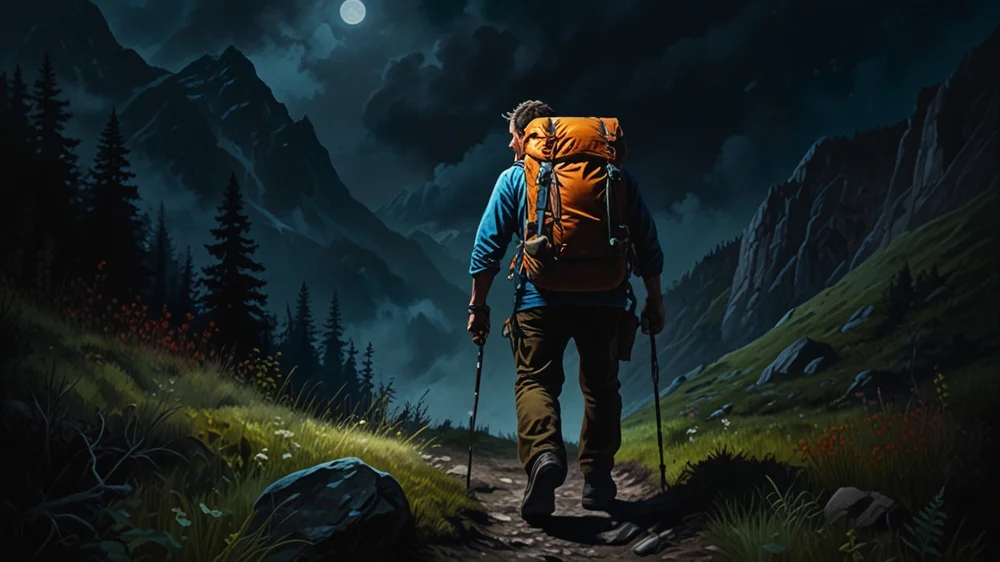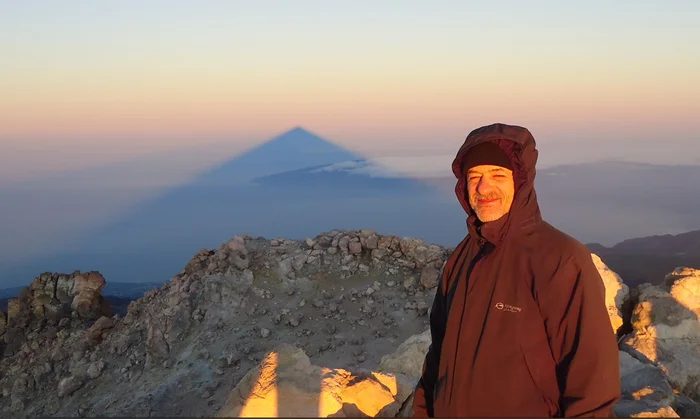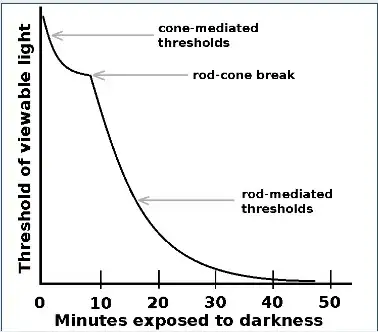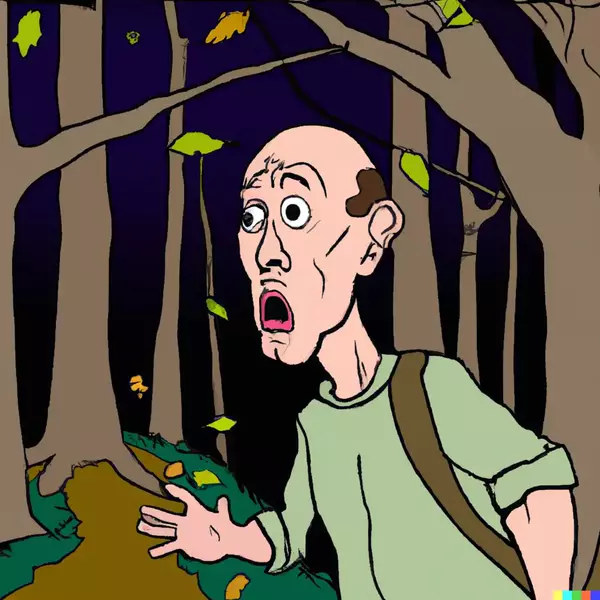If you want to get to the summit to enjoy the sunrise, you will have to start at night. In other situations, you might experience slow progress on your hiking route and get caught by darkness on the trail. So it is important to know how to behave in such situations.
Night hiking is far more dangerous than day hiking. But there may be situations where you cannot avoid it, so here are a few tips that might help in reducing chances for problems:
- Never go without a torch.
- Know you equipment.
- Know the trail.
- If possible, do not go alone.
- If you get lost, do not panic. Prepare for a night under the sky.

Never go without a torch
I write this text from my mountaineering point of view, and this is also affected by the type of mountains where I usually go, and by geography of the terrain. But I am sure most of this applies also to hiking and backpacking.
So if you want to get to the summit and enjoy the sunrise, you will have an early start. Do you know that there is even a term for this? They describe it as an alpine start.
Now, how early? Well, this will depend on the summit and on the place where you stay the night. But you can definitely have a few hours of walk on a rough terrain in a complete darkness. Having a lamp in such situations is a must.
The picture below shows one example, this is me on the summit of El Teide after walking up overnight. I can tell you, it is worth it.

Sometimes you have to do such tours simply because of possible weather changes later during the day. This is typical in areas with sharp mountain peaks and with deep valleys, and I have experienced this many times in the Alps.
My rule is simple, I always have a torch in the backpack, and this is even when I make day tours. There is no exception of this rule. The devil never sleeps.
The last time I was on the mountain without a torch was when I climbed Mount Fuji overnight. This was in 2003, so twenty years ago. It was stupid, I know.
What if the torch fails?
Can it really happen, can the torch fail completely? Trust me it can. The last time this happened to me was on one of my climbs to Mount Teide, Tenerife.
I was on the summit to see the sunset, so I knew I would descend in the dark, and I had my lamp. But on the way down, I was walking through the clouds. I mean literally.
Humidity was probably the maximum possible, and my torch failed. So I continued slowly in a complete darkness. The good thing is that I knew the route well, so I was not really in danger. But on some other mountain, the story would be potentially very different.
Give your eyes time to adjust
I have seen some strange advises around, about using the torch sparingly. This would means with interruptions, to preserve the batteries. The problem with this is that in the intervals without light, you will see nothing.
It is essential to allow your eyes to adjust to the darkness, and this takes a time. If you use the light occasionally, this will have a negative effect. In other words, use the light all the time, or do not use it at all. So, how long does it take our eyes to fully adjust to the dark?
From what I know, and I am not a medical doctor of course, I am a theoretical physicist only, there are different types of cells in our eyes, rods and cones. Rods are only for black and white and they are sensitive even at very low light. Cones are for fine details, but they need more light for this.
The point is in the following – rods require 30-45 minutes to adapt to darkness. This is what you can find in some reputable source. So if you interrupt this process by switching the light on and off, there is no way your eyes will ever adapt. You see the point?
The picture below shows what I was describing above, this is from the article entitled “How long does it take our eyes to fully adapt to darkness?” It shows a typical sensitivity of human eyes as they adapt to darkness:

Know your equipment
Have you ever been in a military service? If yes, then you know they force you to dismantle the gun and then to make it in order again while blindfolded or in a complete dark. I have had my compulsory 12 months in the army, and this was a standard exercise.
The same level of skill you should have with your outdoor equipment. I always know exactly where my things are located. I like to have plenty of pockets in a backpack, and I always keep things in the same place. So I do not need a light to find anything and to do things required on the route.
Know the trail
This is easier said than done. If you have never been in the area, it is impossible to know exactly what you can expect. With the technology, this is easier. But this is not my way, I do not have a GPS or anything similar. What if your gadget fails?
So I try to memorize the map and to remember details. Sometimes I even make notes and read if I have light.
It is important not to rush unless you have to. Even in the darkness, you can perhaps still see some details of the peaks around and this will help you to understand better where you are.
Going slow also reduces chances of injury. So take your time to avoid falling.
Do not go alone
In this respect, I admit, I am a very bad example as I normally go solo. But do not listen what fools are telling you and play safe.
It is safer to go with somebody. If you know that there may be dangerous animals around, make sure you make noise on purpose. This will reduce chances for a close encounter.
Honestly speaking, it can be scarry when you are in a complete darkness and on an unknown terrain. I know this from my own first hand bad experience.

What if you get lost in the darkness?
This indeed happens. I know somebody who went on a volcano on Hawaii, and he got lost. He was not a hiker at all, just a tourist, and a physicist like me.
So he did the only reasonable thing, prepared as much a possible for a long night under the sky. It was on a high elevation, and clearly far from pleasant for somebody who did not have anything for the night outdoors.
But he did not do stupid things, he realized that finding the way back was impossible. So he found a place to spend the night, and remained quiet till the morning. He eventually found his way back and survived to tell the story.
Final thoughts
To summarize, hiking at night is frequently a necessity, I have been doing this all my mountaineering life, and I am still around. So it can be done in a safe way. But it is important to play safe and follow some basic rules.
I hope this text has helped a bit. If you have questions or comments, please use the comment box below. Check also my another text about nose running in the mountains, this is something that I experience all the time. Thank you for reading and have a nice day.
Leave a Reply